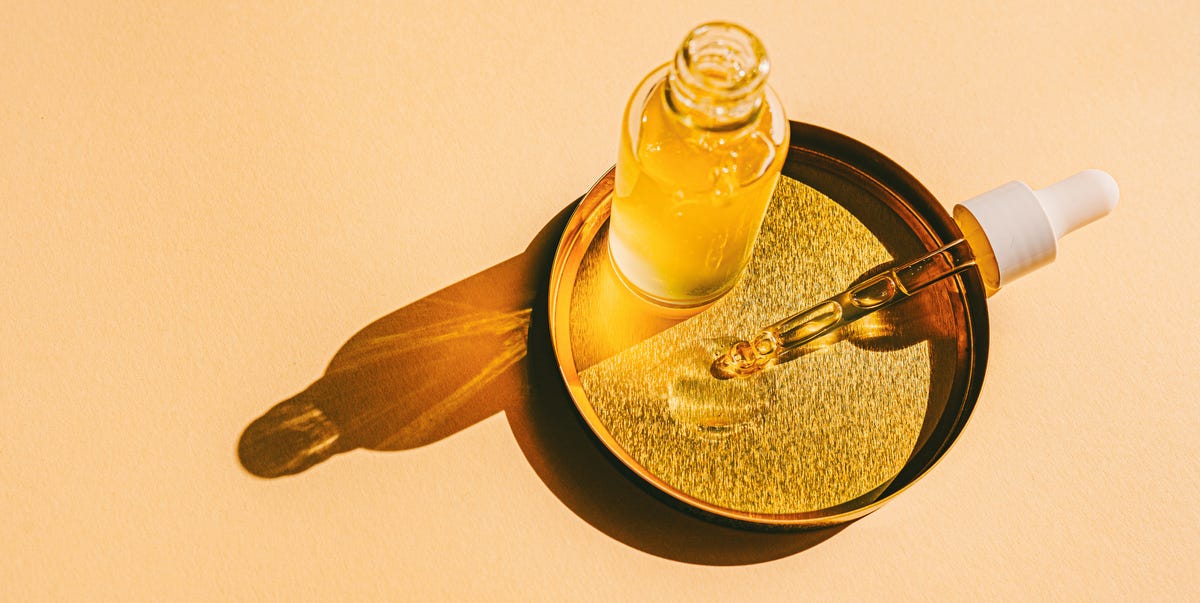The internet is no stranger to unconventional health and beauty trends—from using beef tallow as moisturizer to rocking wrist weights and mewing to sculpt your jawline. Now, a new social media trend is on the rise—and it involves putting castor oil in your belly button. (Yes, you read that right).
This funky health trend quickly gained traction when aesthetic nurse practitioner Miranda Wilson, RN, took to TikTok to share her positive experience with the alleged debloating hack, saying, “POV: You started doing castor oil navel pulling to help with digestion and your stomach has never been so flat.” In the ten-second video, she takes a large bottle of castor oil and pours a generous amount into her belly button, then massages it in gently with her fingers.
Wilson’s video promptly went viral—it now has 5 million views—as users swarmed to the comments section to share their mixed views on the practice. Some eagerly agreed with Wilson, claiming that navel pulling with castor oil really does work wonders (a few commenters even claimed it helped them manage conditions such as endometriosis and period cramps). Others insisted it’s just a placebo effect. One user commented, “Make my belly button drink castor oil… got it. 🤣❤️”
So, the million dollar question: Does navel pulling with castor oil actually help with bloating and digestion? Below, experts explain why this trend might not be all it’s cracked up to be—and share other alternatives to combat your tummy issues and improve your gut health.
Meet the experts: Matthew Bechtold, MD, is the section chief of gastroenterology at the Harry S. Truman Veterans Hospital and adjunct professor of clinical medicine at the University of Missouri-Columbia. Melinda Ring, MD, is the director of the Osher Center for Integrative Health at Northwestern University.
What is navel pulling?
Navel pulling with castor oil involves applying oil on the abdomen, either by rubbing it on directly or by packing the abdomen with pieces of fabric soaked in castor oil, says Matthew Bechtold, MD, section chief of gastroenterology at the Harry S. Truman Veterans Hospital and adjunct professor of clinical medicine at the University of Missouri-Columbia.
The practice of navel pulling isn’t just a social media fad. In fact, it’s rooted in an ancient Ayurvedic practice, says Melinda Ring, MD, director of the Osher Center for Integrative Health at Northwestern University. Ayurveda is a holistic system of medicine that began over 3,000 years ago in India, per Johns Hopkins Medicine.
“Navel pulling is derived from the Ayurvedic traditional medicine system practice called nabhi chikitsa, a therapeutic approach to restoring health through the nabhi (navel), which is considered an important marma (vital energy) point,” Dr. Ring says. “In Ayurveda, castor oil is often employed to treat constipation, promote bowel movements, and detoxify the body.”
In the Ayurvedic practice, it’s believed that in the navel, there’s something called the “Pechoti gland” that allows for the absorption of oils, says Dr. Bechtold. However, there is no scientific evidence to suggest that the Pechoti gland actually exists.
Does navel pulling with castor oil help with bloating and digestion?
Experts say no. However, when taken orally, castor oil can help with stomach issues like constipation.
Castor oil can have a laxative effect, says Dr. Ring. (In fact, the FDA has even approved the use of castor oil as an oral stimulative laxative, though it’s not recommended as a first-line treatment due to side effects like cramping.)
Despite its history and cultural significance, there’s no evidence that pouring it into your navel affects your GI tract, stomach, or other internal organs that help keep things running smoothly.
Although castor oil has anti-inflammatory and antioxidant properties, it can’t reach your organs, even through navel pulling—so any potential benefits would be from topical use, says Dr. Bechtold.
Benefits And Risks Of Navel Pulling And Castor Oil
Apart from potentially staining your clothes, there aren’t any major risks of putting castor oil in your belly button, experts say.
There are, however, risks of drinking castor oil. It could cause electrolyte imbalances, and if you have sensitive skin, you might also experience itching and redness, per a 2024 article in StatPearls. Pregnant people should also steer clear since drinking castor oil could lead to contractions—it’s an old method to induce labor.
Additionally, if you have IBS or other GI issues, castor oil may have too much of a laxative effect.
It is also not recommended for people with a history of an eating disorder, since it may trigger laxative abuse, per StatPearls.
Even if castor oil doesn’t help flatten your stomach, there is one science-backed pro when it comes to using castor oil topically: It is pretty moisturizing. “Castor oil is really rich in fatty acids, which help hydrate the skin,” says Dr. Bechtold.
The bottom line? If you’re curious about navel pulling with castor oil, want to give it a try, and have no medical conditions that interfere with the use of castor oil, it’s probably fairly safe—but always consult your healthcare provider before trying it.
Natural Ways To Reduce Bloating And Help Digestion
There are many other natural and research-proven ways to reduce bloating and better your gut health instead of using castor oil. Here are a few easy things you can add to your routine to make your tummy happy, according to Dr. Bechtold and Dr. Ring.
1. Exercise regularly. Moving your body—even if it’s a 15-minute walk after lunch—is a great way to keep you regular. If you tend to feel bloated a lot, exercising can help move things around and potentially relieve gas, says Dr. Bechtold. Adults should get about 150 minutes of moderate-intensity aerobic activity per week, according to the Centers for Disease Control and Prevention (CDC).
2. Tweak your diet. A low-FODMAP diet can help combat bloating and digestion problems, says Dr. Bechtold. (“FODMAP” is just a fancy-schmancy acronym to describe certain foods that can mess with your GI tract.) Some of the best low-FODMAP foods include bananas, olives, arugula, brown rice, almonds, beef, chicken, and eggs, to name a few. “Limiting salt and carbonated beverages also helps, as well as staying hydrated to soften stools and make them easier to pass,” says Dr. Bechtold.
3. Massage your stomach. You don’t even have to go to a pro—a good ol’ fashioned belly rub can even aid with constipation and bloating, says Dr. Bechtold. “Try using a circular motion with the fingertips over the abdomen from the beginning of the colon in the lower right abdomen, up the right side to the rib cage, across the top of the abdomen from the right to the left, and down the left side to the pelvis,” he says.
4. Try probiotics. “Certain probiotics, such as Bacillus coagulans MTCC 5856, have shown potential in reducing symptoms of gas and bloating in clinical trials,” says Ring. Other dietary additions, like taking anti-bloat supplements, can also be beneficial in soothing tummy troubles. If drinking tea is your cup of tea, even sipping on some peppermint or chamomile tea can help keep bloating at bay and improve intestinal transit, adds Dr. Ring. As always, though, you should speak with your physician prior to adding any supplements or probiotics to your daily regimen, Dr. Bechtold says.
Zoë Hecht is a California-based writer and editor who enjoys writing about beauty, fashion, lifestyle, and pop culture. She graduated from Loyola Marymount University, where she received her B.A. in English. Other than Women’s Health, her work can be found on Byrdie, Teen Vogue, and more. When she’s not writing, you can find her reading, sipping coffee, and scrolling through Pinterest.
Read the full article here




